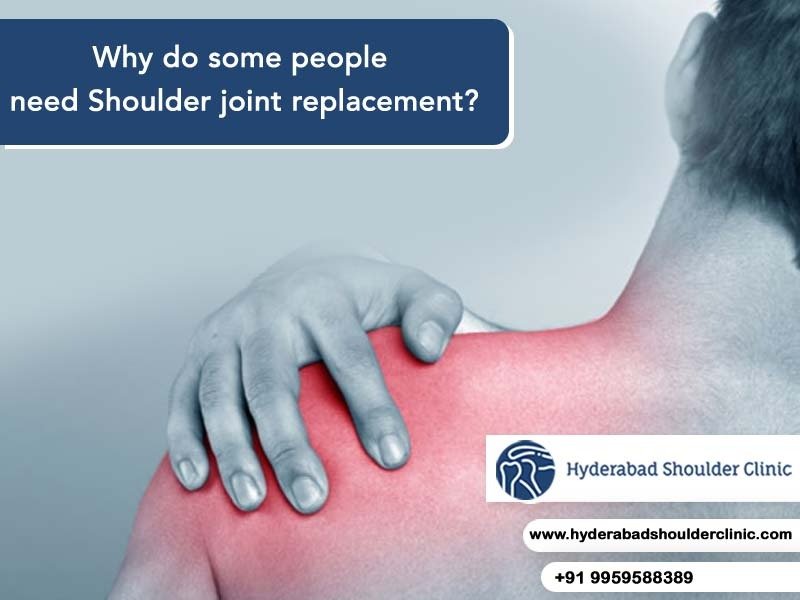A shoulder replacement is a surgical procedure used to treat painful and dysfunctional joints by replacing damaged or worn-out components of the shoulder joint with prosthetics.
Various reasons can lead to shoulder replacement surgery, such as osteoarthritis, rheumatoid arthritis, a large tear in the rotator cuff muscles and avascular necrosis etc. The primary intention of the shoulder replacement procedure is to alleviate pain, restore shoulder strength, improve range of motion, and restore the ability to use the shoulder and arm freely.
Why is a shoulder replacement done?
When a patient is suffering from joint dysfunction, shoulder replacement surgery may be an option.
The common reason for a shoulder joint replacement is arthritis, rotator cuff tear arthropathy, avascular necrosis and severe fractures sustained in an accident or fall. Doctors generally consider non-surgical treatment options like physical therapy and medications first to treat your shoulder problems. Then, when those treatments are ineffective, they proceed with shoulder replacement surgery.

If you have any of the following symptoms, shoulder replacement surgery may be an option for you:
- If you have severe pain in your shoulder which prevents you from carrying out your daily activities such as bathing, getting dressed and lifting things.
- Your shoulder is losing its range of motion.
- Shoulder weakness.
- You may experience intense pain in the shoulder so that you can’t sleep well at night.
- The pain doesn’t go away even after trying other treatment options such as anti-inflammatory medications, cortisone injections, and physical therapy.
- People who have undergone previous surgeries for rotator cuff tear or fracture repair were unsuccessful in alleviating their symptoms.
Types of shoulder replacements
You will discuss with your surgeon the type of shoulder replacement you need and what suits you. Your options are as follows:
Shoulder Hemiarthroplasty: The stem and ball are the only components replaced during this procedure. During this procedure, the stem is attached to the ball and synchronizes with your natural socket.
Resurfacing Shoulder Hemiarthroplasty: This procedure involves replacing the humerus head surface in the shoulder joint with a cap-shaped prosthesis, and it does not have any stem attached to it.

Anatomic Total Shoulder Replacement: In this procedure, the damaged joint is replaced with a metal ball mounted on a stem on the humerus, and a cup-shaped plastic part is fixed on the glenoid socket.
Stemless Total Shoulder Arthroplasty: This is a form of shoulder replacement that preserves the bone structure by attaching the metallic ball directly to the upper arm bone without any stem.
Reverse Total Shoulder Replacement: In the case of reverse total shoulder replacement, the total anatomy of the shoulder joint is reversed, i.e., the glenoid socket is replaced by a metal ball, and a plastic cup replaces the stem, and then it is moved to the humerus (upper arm bone).
Possible complications of shoulder replacement surgery
There is some risk associated with every surgery. Even in shoulder replacement surgery, there are a few possible complications. However, there are certain treatments to overcome them, but preventing them is the ideal option by following the doctor’s advice and tips precisely.
Infection: you should maintain proper hygiene around the wound post-surgery; otherwise, you may be at risk of minor infections in the wound area. However, minor infections are treated with some antibiotics, and major infections might need additional surgery.
Dislocation: There is a possibility of implant dislocation after a reverse total shoulder replacement. A closed reduction or revision surgery may be necessary to fix the implant.

Other problems with a prosthesis: The materials used in the prostheses are metal and plastic, which can wear down over time. Sometimes the implants may also get loose. So revision surgery might be necessary sometimes.
Nerve injury: Sometimes, surgical procedures can cause nerve damage.
Patients with certain health problems like diabetes, bone conditions etc., are at an increased risk of complications. For example, diabetic people might experience problems like slow healing of wounds and infections.
To know more detailed information or have any shoulder problems, consult Dr Chandra Sekhar, one of the best shoulder surgeons in Hyderabad. He has more than two decades of experience in treating a wide variety of shoulder problems. Call +91 9959588389 to book an appointment with the doctor.





